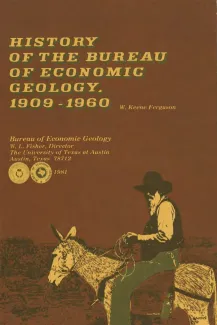
Publication Details
Get the Publication
$6.00
Abstract/Description:
The Bureau of Economic Geology—this bureaucratic title belies the essence of this organization: an ongoing group of professionals with a definite personality. In fact, the history of public geological research in Texas is the story of dedicated, inquisitive scientists shunning the higher salaries and opportunities offered by private enterprise to serve their science and the State of Texas.
The Bureau has survived the emergence of extensive private geological research departments, the creation of geological departments in various state agencies, and the threatened encroachment of the Federal Geological Survey. Not only has the Bureau survived, but it has also gained strength and stature throughout its history and now stands at the forefront of basic geological research, energy investigations, and ecological studies in Texas. Throughout its existence, the geologists in this story have made the Bureau a receptive, personal organization, welcoming all inquiries and visitors in search of help in solving geological problems related to both mineral production and public resource demands. The people of the Bureau have served both the public interest and private enterprise for 50 years, with never a hint of scandal to cloud the horizon.
This history covers the first half-century of the Bureau's existence, up to the death of the fourth director, Dr. John T. Lonsdale, in 1960. The Board of Regents of the University of Texas officially activated the Bureau of Economic Geology on October 21, 1909, in response to the urgings of William B. Phillips and University President Sidney E. Mezes. Phillips, who became the first director of the Bureau, had also headed the short-lived predecessor of the Bureau, the University of Texas Mineral Survey, from 1901 to 1905. (The history of the Mineral Survey and all previous state geological surveys in Texas is presented in Geology and Politics of Frontier Texas by the same author; see note 3).
From Director J. A. Udden’s pioneering contributions to the developing science of oil geology to current Director William L. Fisher’s leadership in the search for solutions to the state's ecological and energy problems, from the few offices in old "B Hall" housing a staff you could count on one hand to today’s generously staffed and funded modern offices, the Bureau has been outstanding in its service to the people of Texas.